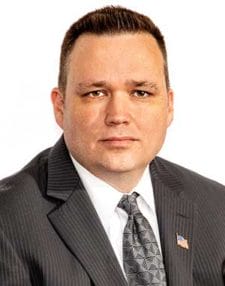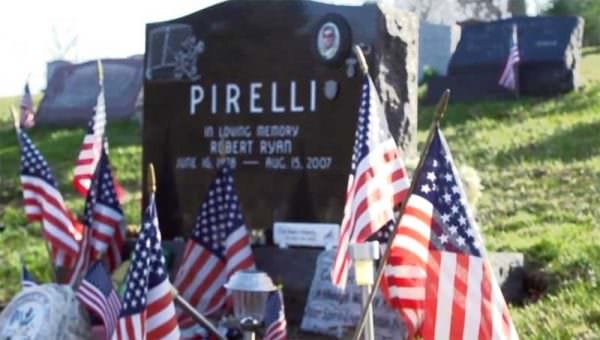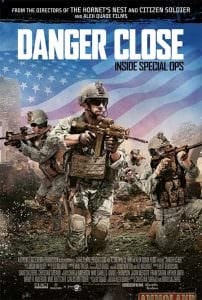By John Crump

U.S.A. –-(Ammoland.com)- Being a war correspondent in a warzone is a tough job. Being the only war correspondent embedded long term with the Army 10th Group Special Forces while being a woman is tougher. This is what Alex Quade did for two years through the wars in Afghanistan and Iraq and is documented in her upcoming film Danger Close.
Alex Quade is best known for her war reporting for CNN and other news organizations. This time, armed with only a video camera and notebook, Ms Quade documents the life of the ODAs (Special Forces Operational Detachment Alphas) through harrowing combat footage and interviews with the families that these warriors leave behind, but this movie is much more than just that.
It is a story of a journey to fulfill a promise to the men that she was embedded with and one promise she was determined to keep.
She earned the respect of the men of the ODA she embedded with. I talked to one of the guys that was there at the same time and he told me about how that she didn’t only earn their respect, but their trust. This is recounted to me from a story Alex told me about a senior weapons sergeant being worried she would hurt herself on the Barrett .50 cal when he was showing it to her. They cared about her and she cared about the men.
Alex Quade and Danger Close
There was also real danger. She wasn’t “in the rear with the gear”. She was going on missions and taking fire. A Special Forces Commander informed Alex that everyone of his men were on a hit list by name and by virtue this would put her in the cross hairs as well. She decided if the unit that she was with was to be over run she should not allow herself to be captured, but would save a bullet for herself to prevent herself from being used as a propaganda tool in a internet video as have happened to other colleagues of hers.
I had a chance to screen Danger Close and spend sometime talking to Alex Quade about the movie and her time embedded with the Green Berets. I learned a lot from Alex. Not only about her, but about the sacrifices that these elite warriors and their families go through. It is a real eye opening experience and I highly recommend the movie not only to war historians, but anyone who wonders what it is like to be a part of a brotherhood that is so close that makes you more than just teammates. It makes you family.
John: Alex, what is your background?
Alex: I have been a war reported since 1998. I covered Kosovo, Macedonia, Albania, and since 9/11 it has been pretty much all Iraq and Afghanistan. I basically became CNN’s embed queen, which wasn’t an official title. I was embedded with all different units from every branch of the military. Some point around 2006 I thought “what haven’t I had access to?”, and that was the special operations community. I thought “this is going to be a tough nut to crack, but I am going to crack it.”
John: How did you get embedded with the Green Berets?
Alex: That was going through what I call “the provision gauntlet of pain.” Trying to convince everybody, doing paperwork, and dealing with the DOD. It was whole lot of gumshoe reporting, tenacity, knocking on doors, sleeping outside offices and on tarmacs, doing what I had to do to get in.

John: Why do you want to share the Special Forces soldier’s stories?
Alex: I think it is really important to the American public to come away with a little sense of what their elite service members are doing, and know there are elite American warriors out there who will never quit. Who will always continue the mission despite horrendous circumstances which in course includes a shootdown of a Chinook helicopter and an ODA team mate getting killed.
It is really important for the American taxpayer to get a little sense of what their operators do. Also for the special operations community there is always that argument that “we can’t let reporters in because they will give away techniques, tactics, and procedures (TTP)”, or they think we will make it so these operators can’t do their jobs in the future.
I think there is a way to be able to tell stories of our special operations forces without compromising the mission, without compromising these personnel and TTP. The American taxpayer deserve to see a little bit, to understand a little bit. Especially the fact we need to document this for history so their sacrifices will not be forgotten.
These special operators you see in the film will never leave a fallen soldier behind, and I really believe the truth should not be left behind either.
John: How did they receive you being embedded with them?
Alex: You kind of have to be as tough as woodpecker lips. It was not a cakewalk to get access, to get into those Special Forces teams, or to get them to trust me because they do not like reporters,,, period. It is also a throwback to Vietnam. The Green Berets don’t care to have reporters with them, and of course this is a closed and secretive community for a reason.
They are out there fighting quietly in around 73 countries right now. You will have to check with SOCOM on that, but they are fighting on our behalf and nobody knows what they do. There is probably a lot of things they do that we don’t need to know about. I didn’t drink the “Coolaid”. I just earned a unique vantage point alongside these Special Forces teams and got to go along on their missions, and witness first hand the capabilities of what a very small group of very highly trained individuals can do to effect the battle space and force multiply.
I really hope the audience gets a glimpse of these ODAs over a two year period, and gets a chance to see this change of mission in progress that went from direct action unconventional warfare to more internal defense. It is really important for the audience to come long for a ride, and be able to understand a little bit.


John: Do you feel that the soldiers sacrifices are understood by the general public?
Alex: That is what I am hoping we are able to share with the film and what I was always hoping to show. It is my mission as a journalist to show the human side and to try to make something that is hard to understand understandable.
Sharing these stories for me is not a job. It is my heart and my soul. I really want the audience to feel what these Special Forces soldiers and their families go through and to try to experience what their lives in and out of combat is like. Really the only way to do that is to walk a mile in their shoes. That is what I hope we are doing in Danger Close.
I want to take the audience along for this very intimate experience. I try to do that with a little camera and a notebook. I am basically the audience. I am there with my camera and asking really stupid questions because I want everything to be understandable.
I want the audience to share the experience of combat, and to be able to see the dedication that these Green Berets have that are serving downrange. It is very important to show the courage of their families that are back home. Especially Gold Star families like that of Green Beret Staff Sergeant Rob Pirelli’s family who has sacrificed very greatly.
I am just very dedicated to telling the stories of our quiet professionals otherwise there may not be any or very few documentations of what they have done, and it is also really important for me to show there is human beings behind the hardware. It is trying to make ununderstandable understandable and try to make the viewers empathize a little more.
It is a very human story, meaning sharing the universal truths and these human moments that transcend these battle scenes.
John: You bring up the family of Robert Pirelli. You visited them. How did they receive you?
Alex: They invited me to the Gold Star Memorial service. That is where I actually met them. Rob’s team reached

out to them on my behalf because I wanted to link up with them. The team said “we have this reporter that was with us, and she is trying to pay tribute and share Rob’s story and some of the things we have done.”
I met Rob’s father Bob and his sister Stacy at Ft Bragg. US Army Special Operations Command does a Gold Star memorial service every Memorial Day Weekend for all of the special operators killed in action in the year past, and I met them there and spent the whole weekend with them. I was there when they walked up to the Memorial Wall and put the carnations down in the rain against the wall.
We had very good and intimate talks about Rob. We talked about his team and the importance of letting America not forget. There was a moment that was not in the film that I gave Bob Pirelli the team photo that you see in the film that has the Combat Outpost Pirelli insignia on the T wall. I had blown it up and put it in plastic.
I gave it to him that weekend and he looked at it, and he very promptly said, “Let’s go to Bragg Boulevard .” Before the next event he had the COP Pirelli insignia tattooed onto his calf. To me that shows the love of a Gold Star family, and the love of a father for a son. It also shows the love of the brotherhood for each other that they renamed the outpost and designed and painted this insignia on a t wall. It was so important for the family and the team that people don’t forget about Rob.
When everybody was making me promise that I would try to get over there back to COP Pirelli, me this little lone female reporter with no camera crew, no support, with no nothing they intrusted me to make it happen. There was no way it wasn’t going to happen regardless of what it takes. So I think it is very important to try to show the service and the sacrifice of just not our troops, but what the families also go through.
John: What do you think should be done to remember the fallen soldiers?
Alex: Getting more stories like this out there and trying to share a little bit about service members coming home and retiring and their missions. It is important for the service members to share their stories and to be able pass these stories down to their families and their civilian friends because in that way their memories live on and they are not forgotten.
America does love their troops, and I hope our Gold Stars are not forgotten. It takes sharing their stories.

John: What do you think drives these guys to do what they do?
Alex: These are absolutely elite warriors. They have a warrior’s ethos, and being the elite of the elite they are highly trained, but they are also highly chosen. They go through so much just to get to where they are at. It takes a very unique individual to become a Special Forces soldiers.
John: Did you ever feel that you were in danger?
Alex: Absolutely! It comes with the territory. Not to sound cocky or anything, but there is a lot of stuff. In having 300 hours of combat footage there is only so much you can shove into an 87 minute film. There was many moment. I just don’t really think about it because I am just there with the soldiers being a pesky fly on the wall. I don’t feel like the story should be about me. I feel the stories should be about them. Anything they are coming under I am also coming under too.
You are just so laser focused. They are doing their jobs and I am doing my job, you just don’t really think about the danger. It is when you come home and are going through every single frame of video and I am like “oh that was kind of close.”
John: How many years did you work on your documentary?
Alex: When I came back I was still going out doing interviews and doing follows ups. I was tracking down every aircraft that was racked and stacked on every single mission. I was tracking down every single crew, every team, and every family member. It still took me time to do all the after action interviews.
Since then slowly but surely with my video editor from Atlanta I have gotten a bunch of little stories out there. It might be a 10 minute piece or a 20 minutes video for the New York Times Online, or some side things for CNN. I have been able to get some stories out. It has been great to work with a full edit team to put this one together
John: What is up next for you? Any new documentaries?
Alex: I am still sitting on 300 hours of combat footage. If you think every single mission is a story, and every single day over there has stories in them I could be doing stories for years. Right now I am on deadline writing a book about the Special Forces so there will be more of these adventures and stories ahead that couldn’t make it into the film. Perhaps I will find a news organization interested into making more of these stories.
Otherwise I am just itching to get back down range. I have had invites from teams to be over there right now and it is killing me because I see what is happening in the news. I wish I was there, and I feel like I am letting down the guys because I am not there to document some of their work.
John: How can people see Danger Close?
Alex: It comes out in theaters on Friday April 28th in major cities in a limited release. Then it will be video on demand and on sale on DVD in places like Walmart and Target on May 16th.
Danger Close is available for preorder on Amazon.com
About John Crump
John is a NRA instructor and a constitutional activist. He is the former CEO of Veritas Firearms, LLC and is the co-host of The Patriot News Podcast which can be found at www.blogtalkradio.com/patriotnews. John has written extensively on the patriot movement including 3%’ers, Oath Keepers, and Militias. In addition to the Patriot movement, John has written about firearms, interviewed people of all walks of life, and on the Constitution. John lives in Northern Virginia with his wife and sons and is currently working on a book on the history of the patriot movement and can be followed on Twitter at @crumpyss or at www.crumpy.com.
